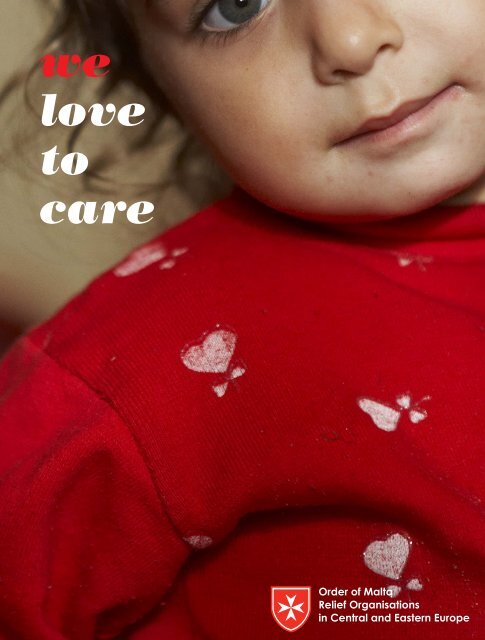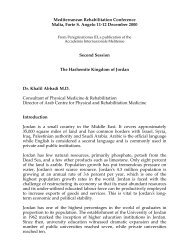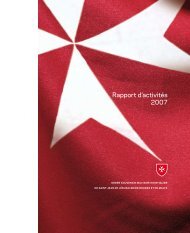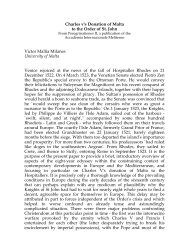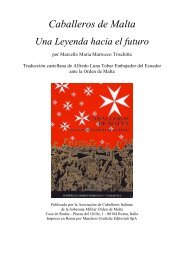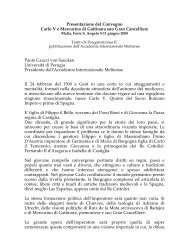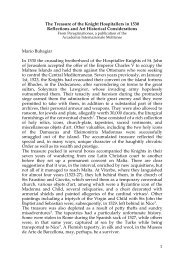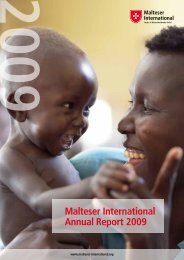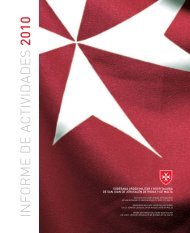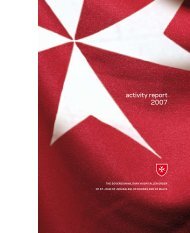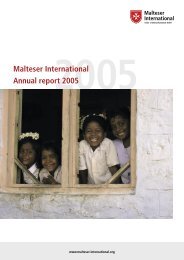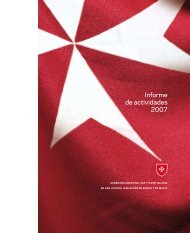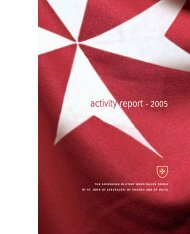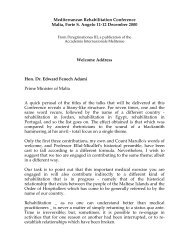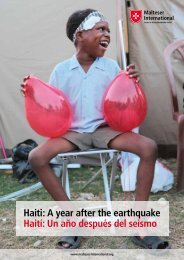we love to care â order of malta relief activities in central and eastern ...
we love to care â order of malta relief activities in central and eastern ...
we love to care â order of malta relief activities in central and eastern ...
Create successful ePaper yourself
Turn your PDF publications into a flip-book with our unique Google optimized e-Paper software.
<strong>we</strong><br />
<strong>love</strong><br />
<strong>to</strong><br />
<strong>care</strong><br />
Order <strong>of</strong> Malta<br />
Relief Organisations<br />
<strong>in</strong> Central <strong>and</strong> Eastern Europe
Impressum<br />
Publisher Details<br />
Edi<strong>to</strong>r:<br />
Europe/Malteser<br />
Responsible for content:<br />
Texts <strong>and</strong> Pho<strong>to</strong>s:<br />
Cover Picture:<br />
Edi<strong>to</strong>rial staff:<br />
Layout:<br />
Order <strong>of</strong> Malta Relief Organisations <strong>in</strong> Central <strong>and</strong> Eastern<br />
Ausl<strong>and</strong>sdienst, Kalker Hauptstr. 22-24, 51103 Köln,<br />
Tel. (0221) 98 22 151, E-Mail: <strong>in</strong>fo@<strong>malta</strong>net.org<br />
CEE Steer<strong>in</strong>g Committee<br />
Order <strong>of</strong> Malta Relief Organisations <strong>in</strong> CEE, Birgit Betzelt,<br />
An<strong>to</strong>nello Nusca<br />
Birgit Betzelt<br />
Jan<strong>in</strong>e Lietmeyer, Alex<strong>and</strong>ra Hanratty<br />
KA.E für neues h<strong>and</strong>eln GmbH, Köln/Berl<strong>in</strong><br />
2 <strong>we</strong> <strong>love</strong> <strong>to</strong> <strong>care</strong>
Mission<br />
The The Order <strong>of</strong> Malta Relief Organisations <strong>in</strong> Central <strong>and</strong> Eastern Europe <strong>care</strong> for people <strong>in</strong> need, for the poor, sick, disabled <strong>and</strong><br />
other marg<strong>in</strong>alized groups by <strong>of</strong>fer<strong>in</strong>g susta<strong>in</strong>able help, provid<strong>in</strong>g effective aid with a real impact. To fulfill this mission the organizations<br />
render various medical <strong>and</strong> social services with high competence <strong>and</strong> pr<strong>of</strong>essionalism. Voluntary work <strong>and</strong> active youth work operations<br />
underl<strong>in</strong>e the conv<strong>in</strong>c<strong>in</strong>g pr<strong>in</strong>ciples <strong>of</strong> their engagement. Be<strong>in</strong>g works <strong>of</strong> the Order <strong>of</strong> Malta <strong>and</strong> follow<strong>in</strong>g its 900-year tradition <strong>we</strong> are<br />
committed <strong>to</strong> the Order’s pr<strong>in</strong>ciple “Exemplify the faith <strong>and</strong> serve the poor <strong>and</strong> suffer<strong>in</strong>g”.<br />
Vision<br />
The Order <strong>of</strong> Malta Relief Services <strong>and</strong> Aid Organizations <strong>in</strong> Central <strong>and</strong> Eastern Europe belong <strong>to</strong> the most acknowledged organizations<br />
who are us<strong>in</strong>g their potential under a common br<strong>and</strong> <strong>and</strong> with<strong>in</strong> a network as its best <strong>in</strong> <strong>order</strong> <strong>to</strong> support the sick, poor <strong>and</strong> people <strong>in</strong><br />
need. Thereby, they contribute <strong>to</strong> mak<strong>in</strong>g the <strong>love</strong> <strong>of</strong> Jesus Christ palpable on earth.<br />
<strong>we</strong> <strong>love</strong> <strong>to</strong> <strong>care</strong> 3
The Order <strong>of</strong> Malta – His<strong>to</strong>ry<br />
<strong>and</strong> Mission<br />
The orig<strong>in</strong> <strong>of</strong> the Sovereign, Military <strong>and</strong> Hospitaller Order <strong>of</strong> St. John <strong>of</strong> Jerusalem, <strong>of</strong> Rhodes <strong>and</strong> <strong>of</strong> Malta – better known as the Order<br />
<strong>of</strong> Malta – go back <strong>to</strong> the eleventh century.<br />
In accordance with the Constitutional Charter, the purpose <strong>of</strong> the Sovereign Order <strong>of</strong> Malta is ‘the promotion <strong>of</strong>…the Christian virtues <strong>of</strong><br />
charity <strong>and</strong> brotherhood. The Order carries out its charitable work for the sick, the needy <strong>and</strong> refugees without dist<strong>in</strong>ction <strong>of</strong> religion, race,<br />
orig<strong>in</strong> or age. The Order fulfils its <strong>in</strong>stitutional tasks especially by carry<strong>in</strong>g out hospitaller works, <strong>in</strong>clud<strong>in</strong>g health <strong>and</strong> social assistance, as<br />
<strong>we</strong>ll as aid<strong>in</strong>g victims <strong>of</strong> exceptional disasters <strong>and</strong> war…’.<br />
Dur<strong>in</strong>g the Cold War the Order was prohibited <strong>to</strong> work <strong>in</strong> the region for more than forty years. Today, it has successfully re-established its<br />
presence across Central <strong>and</strong> Eastern Europe after communism collapsed symbolised by the fall <strong>of</strong> the Berl<strong>in</strong> Wall <strong>in</strong> November 1989.<br />
4 <strong>we</strong> <strong>love</strong> <strong>to</strong> <strong>care</strong>
HISTORICAL SURVEY<br />
1048: JERUSALEM<br />
The foundation <strong>of</strong> the Hospitallers <strong>of</strong> St.<br />
John <strong>of</strong> Jerusalem as a monastic community<br />
by the Blessed Gerard. Knights <strong>of</strong> the<br />
Order <strong>care</strong> for pilgrims, the sick <strong>and</strong> the<br />
needy, as they have done ever s<strong>in</strong>ce. By<br />
virtue <strong>of</strong> the Papal Bull <strong>of</strong> 1113 issued by<br />
Pope Paschall II, the hospital <strong>of</strong> St John is<br />
placed under the aegis <strong>of</strong> the Church, <strong>and</strong><br />
granted exemptions. With the responsibilities<br />
<strong>of</strong> military defence <strong>of</strong> the sick <strong>and</strong> the<br />
Christian terri<strong>to</strong>ries, the Order evolves <strong>in</strong><strong>to</strong><br />
both a religious <strong>and</strong> military chivalric Order.<br />
1310: RHODES<br />
In 1291, with the fall <strong>of</strong> St. John <strong>of</strong> Acre,<br />
the last bastion <strong>of</strong> Christianity <strong>in</strong> the Holy<br />
L<strong>and</strong>, the Order is forced <strong>to</strong> leave the<br />
isl<strong>and</strong> <strong>and</strong> settle <strong>in</strong> Cyprus. It acquires<br />
terri<strong>to</strong>rial sovereignty on tak<strong>in</strong>g possession<br />
<strong>of</strong> the Isl<strong>and</strong> <strong>of</strong> Rhodes <strong>in</strong> 1310. To defend<br />
the Christian world, the Order assembles a<br />
po<strong>we</strong>rful military fleet, patroll<strong>in</strong>g the <strong>eastern</strong><br />
seas <strong>and</strong> engag<strong>in</strong>g <strong>in</strong> several celebrated<br />
battles. Governed by a Gr<strong>and</strong> Master as<br />
Sovereign Pr<strong>in</strong>ce <strong>of</strong> Rhodes, <strong>to</strong>gether with<br />
a Sovereign Council, it m<strong>in</strong>ts its own currency<br />
<strong>and</strong> establishes diplomatic relations<br />
with other States. The Order’s knights<br />
are vic<strong>to</strong>rious over numerous Ot<strong>to</strong>man<br />
attacks until, overrun by Sultan Suliman<br />
the Magnificent with his po<strong>we</strong>rful fleet <strong>and</strong><br />
large army, they are forced <strong>to</strong> surrender on<br />
January 1st 1523 <strong>and</strong>, with the Sultan’s<br />
recognition <strong>of</strong> their bravery, leave the isl<strong>and</strong><br />
with full military honours.<br />
1530: MALTA<br />
The next seven years see the Order without<br />
terri<strong>to</strong>ry, but reta<strong>in</strong><strong>in</strong>g its sovereignty, a<br />
situation which prevailed until Emperor<br />
Charles V granted the knights the isl<strong>and</strong>s<br />
<strong>of</strong> Malta, Gozo <strong>and</strong> Com<strong>in</strong>o, <strong>and</strong> the city <strong>of</strong><br />
Tripoli, as a sovereign fiefdom. On Oc<strong>to</strong>ber<br />
26th 1530, the Order takes possession <strong>of</strong><br />
Malta with the approval <strong>of</strong> Pope Clement<br />
VII. Dur<strong>in</strong>g the Great Siege bet<strong>we</strong>en May<br />
<strong>and</strong> September 1565, the knights rout the<br />
Ot<strong>to</strong>mans under the leadership <strong>of</strong> Gr<strong>and</strong><br />
Master Frà’ de la Valette (who gave his<br />
name <strong>to</strong> the capital <strong>of</strong> Malta). The fleet <strong>of</strong><br />
the Order <strong>of</strong> St. John (or <strong>of</strong> Malta, as they<br />
are now known) is one <strong>of</strong> the mightiest <strong>in</strong><br />
the Mediterranean <strong>and</strong> plays its part <strong>in</strong> the<br />
vic<strong>to</strong>ry over the Ot<strong>to</strong>mans at the battle <strong>of</strong><br />
Lepan<strong>to</strong> <strong>in</strong> 1571.<br />
1798: EXILE<br />
In 1798, Napoleon Bonaparte occupies<br />
Malta en route <strong>to</strong> his campaign <strong>in</strong> Egypt.<br />
He meets with no resistance from the<br />
knights, as their regulations forbid them <strong>to</strong><br />
fight other Christians, <strong>and</strong> thus the Order is<br />
forced <strong>to</strong> leave the isl<strong>and</strong>. By 1801, Malta<br />
is occupied by the British, <strong>and</strong> despite the<br />
recognition <strong>of</strong> the Order <strong>of</strong> Malta’s rights<br />
<strong>of</strong> sovereignty as enshr<strong>in</strong>ed <strong>in</strong> the Treaty<br />
<strong>of</strong> Amiens (1802), it is unable <strong>to</strong> retake<br />
possession <strong>of</strong> the isl<strong>and</strong>.<br />
1834: ROME<br />
Hav<strong>in</strong>g resided temporarily <strong>in</strong> Mess<strong>in</strong>a,<br />
Catania <strong>and</strong> then Ferrara, the Order settles<br />
<strong>in</strong> Rome <strong>in</strong> 1834, <strong>in</strong> properties with extraterri<strong>to</strong>rial<br />
status: the Gr<strong>and</strong> Magistry <strong>in</strong> via<br />
Condotti <strong>and</strong> the Villa Malta on the Avent<strong>in</strong>e<br />
Hill. From this time, the Order’s orig<strong>in</strong>al<br />
mission <strong>of</strong> service <strong>to</strong> the poor <strong>and</strong> the sick<br />
aga<strong>in</strong> becomes its ma<strong>in</strong> activity. The Order<br />
carries out hospitaller <strong>and</strong> charitable <strong>activities</strong><br />
dur<strong>in</strong>g both World Wars, <strong>and</strong> these<br />
<strong>activities</strong> are developed <strong>and</strong> <strong>in</strong>tensified<br />
under the stewardship <strong>of</strong> Gr<strong>and</strong> Master<br />
Frà’ Angelo de Mojana (1962-1988) <strong>and</strong><br />
cont<strong>in</strong>ue <strong>to</strong>day under his successor, the<br />
78th Gr<strong>and</strong> Master, Frà’ Andrew Bertie.<br />
21st CENTURY<br />
Known s<strong>in</strong>ce medieval times as the<br />
Hospitallers, the members, staff <strong>and</strong><br />
volunteers <strong>of</strong> the Order provide health<br />
benefits <strong>to</strong> millions <strong>of</strong> people each year,<br />
<strong>and</strong> the annual value <strong>of</strong> its health <strong>and</strong><br />
humanitarian <strong>activities</strong> worldwide reaches<br />
US$ 900,000,000.<br />
Cover<strong>in</strong>g just eight acres, the Order’s<br />
headquarters <strong>in</strong> Rome are 12 times smaller<br />
than the Vatican (the world’s second smallest<br />
state). This is the home <strong>of</strong> the Gr<strong>and</strong><br />
Magistry which <strong>to</strong>day is the bustl<strong>in</strong>g heart<br />
<strong>of</strong> a major global, pr<strong>of</strong>essional organisation<br />
– a religious lay <strong>order</strong> which is active<br />
<strong>in</strong> 120 countries <strong>and</strong> ma<strong>in</strong>ta<strong>in</strong>s bilateral<br />
diplomatic relations with 97 states, <strong>of</strong>ficial<br />
relations with five European governments,<br />
as <strong>we</strong>ll as permanent delegations <strong>to</strong> the<br />
United Nations <strong>and</strong> other ma<strong>in</strong> <strong>in</strong>ternational<br />
organisations.<br />
The government <strong>of</strong> the Order is chaired<br />
by the Gr<strong>and</strong> Master, who is assisted<br />
by his four State m<strong>in</strong>isters, the Gr<strong>and</strong><br />
Comm<strong>and</strong>er, the Gr<strong>and</strong> Chancellor, the<br />
Gr<strong>and</strong> Hospitaller <strong>and</strong> the Receiver <strong>of</strong> the<br />
Common Treasure.<br />
While these titles are steeped <strong>in</strong> many centuries<br />
<strong>of</strong> tradition, the roles are very much<br />
<strong>in</strong> tune with the <strong>in</strong>creas<strong>in</strong>gly challeng<strong>in</strong>g<br />
dem<strong>and</strong>s <strong>of</strong> the 21st century. As a unique<br />
comb<strong>in</strong>ation <strong>of</strong> sovereign state, charity<br />
<strong>and</strong> aid organisation, the Order is regularly<br />
extend<strong>in</strong>g its <strong>activities</strong> <strong>in</strong><strong>to</strong> new countries<br />
<strong>and</strong> constantly respond<strong>in</strong>g <strong>to</strong> calls for<br />
humanitarian aid.<br />
The Sovereign Order has a permanent<br />
presence <strong>in</strong> 55 countries, through the<br />
<strong>in</strong>termediary <strong>of</strong> six Gr<strong>and</strong> Priories, five<br />
Sub-Priories <strong>and</strong> 47 National Associations,<br />
<strong>in</strong> addition <strong>to</strong> the many hospitals, medical<br />
centres, dispensaries, <strong>relief</strong> corps, foundations<br />
<strong>and</strong> specialised establishments it<br />
looks after <strong>in</strong> 120 countries.<br />
Its 12,500 members <strong>and</strong> 80,000 permanent<br />
volunteers, backed by qualified staff<br />
comprised <strong>of</strong> over 11,000 doc<strong>to</strong>rs, nurses,<br />
auxiliaries <strong>and</strong> other voluntary assistants,<br />
devote themselves <strong>to</strong> serv<strong>in</strong>g the poor,<br />
the sick <strong>and</strong> those who suffer. The Order<br />
is especially <strong>in</strong>volved <strong>in</strong> help<strong>in</strong>g victims <strong>of</strong><br />
armed conflicts <strong>and</strong> natural disasters by<br />
provid<strong>in</strong>g medical assistance, car<strong>in</strong>g for<br />
refugees, <strong>and</strong> distribut<strong>in</strong>g medic<strong>in</strong>es <strong>and</strong><br />
basic equipment for survival.<br />
www.<strong>order</strong><strong>of</strong><strong>malta</strong>.org<br />
<strong>we</strong> <strong>love</strong> <strong>to</strong> <strong>care</strong> 5
6 <strong>we</strong> <strong>love</strong> <strong>to</strong> <strong>care</strong>
Medical Assistance<br />
At the heart <strong>of</strong> the Order’s mission is <strong>to</strong> <strong>care</strong> for the sick <strong>and</strong> poor <strong>and</strong> it has been so<br />
for the past 900 years. We fulfil this mission accord<strong>in</strong>g <strong>to</strong> the challenges <strong>we</strong> face <strong>in</strong><br />
our modern post-communist society. We have taken over considerable responsibility by<br />
provid<strong>in</strong>g a wide range <strong>of</strong> pr<strong>of</strong>essional medical <strong>care</strong>. The deliverance <strong>of</strong> health <strong>care</strong> is<br />
<strong>of</strong>ten coupled with the need for social services; both <strong>of</strong> which aim at the most vulnerable<br />
people who would otherwise be deprived <strong>of</strong> any attention. First aid, especially with many<br />
young volunteers, is a major part <strong>of</strong> medical assistance, <strong>and</strong> has an excellent reputation<br />
<strong>in</strong> the medical sec<strong>to</strong>r.<br />
„Tak<strong>in</strong>g <strong>care</strong> <strong>of</strong> the sick is<br />
our reason <strong>to</strong> exist.“<br />
<strong>we</strong> <strong>love</strong> <strong>to</strong> <strong>care</strong> 7
Where there is no doc<strong>to</strong>r – North Albania<br />
First Aid as an important priority – Pol<strong>and</strong><br />
The North Albanian Alps with heights at almost 8,900 feet make<br />
the northern region the most rugged part <strong>of</strong> the country. Due<br />
also <strong>to</strong> its geographical remoteness, North Albania <strong>of</strong>ten lacks<br />
the fundamental <strong>in</strong>frastructure; <strong>and</strong> greater social problems are<br />
develop<strong>in</strong>g because <strong>of</strong> <strong>in</strong>creas<strong>in</strong>g emigration. In 1993, when the<br />
Albanian <strong>relief</strong> organization <strong>of</strong> the Order <strong>of</strong> Malta (MNSH) started<br />
its medical <strong>activities</strong>, most <strong>of</strong> the mounta<strong>in</strong> areas <strong>we</strong>re without<br />
doc<strong>to</strong>rs, ambulance services or pharmacies. Today, a very <strong>we</strong>ll<br />
equipped MNSH medical team is cover<strong>in</strong>g basic health <strong>care</strong><br />
services, <strong>in</strong>clud<strong>in</strong>g medical visits, necessary therapy, labora<strong>to</strong>ry<br />
analyses, medical specialist’s consultations, emergency transports<br />
<strong>to</strong> hospitals <strong>and</strong> health education tra<strong>in</strong><strong>in</strong>g for the local population.<br />
The project is able <strong>to</strong> <strong>of</strong>fer services <strong>and</strong> a supply <strong>of</strong> medical drugs<br />
<strong>to</strong> four villages with about 5,000 <strong>in</strong>habitants. Special attention<br />
is given <strong>to</strong> Roma families who are <strong>of</strong>ten marg<strong>in</strong>alized <strong>and</strong> therefore<br />
even more deprived <strong>of</strong> social services.<br />
8 <strong>we</strong> <strong>love</strong> <strong>to</strong> <strong>care</strong><br />
Michail Kalaschnikov,<br />
EXECUTIVE DIRECTOR OF THE RELIEF<br />
ORGANISATION IN ST. PETERSBURG<br />
“I feel that my work for the <strong>relief</strong> organisation <strong>of</strong> the<br />
Order <strong>of</strong> Malta <strong>in</strong> St. Petersburg is a vocation correspond<strong>in</strong>g<br />
<strong>to</strong> the philosophy <strong>of</strong> Friedrich-Josef Haas<br />
which says ‚Hurry up <strong>to</strong> do the right th<strong>in</strong>g!’”<br />
As <strong>in</strong> many Central <strong>and</strong> Eastern European countries, NGOs <strong>in</strong><br />
Pol<strong>and</strong> have enjoyed a renaissance s<strong>in</strong>ce 1989 thanks <strong>to</strong> the<br />
re<strong>in</strong>statement <strong>of</strong> freedom <strong>of</strong> assembly <strong>and</strong> association. Numerous<br />
new organisations <strong>and</strong> associations have been created <strong>to</strong> solve<br />
the problems <strong>and</strong> meet the needs <strong>of</strong> modern society. Organisations<br />
have sprung up <strong>to</strong> counteract the effects <strong>of</strong> social problems,<br />
such as homelessness, alcoholism <strong>and</strong> drug abuse. The Order <strong>of</strong><br />
Malta Medical Corps (OMMC) has been established <strong>in</strong> Krakow <strong>in</strong><br />
1990. Today the OMMC has 35 units all over the country. Nearly<br />
2000 members <strong>of</strong> the OMMC are actively work<strong>in</strong>g <strong>in</strong> 35 communities.<br />
Among the volunteers are physicians, nurses, <strong>and</strong> alumni<br />
<strong>of</strong> medical schools, priests, scientists, students, teachers, older<br />
pupils, pensioners, <strong>and</strong> persons <strong>of</strong> different pr<strong>of</strong>essions. All <strong>of</strong><br />
the members <strong>of</strong> OMMC are tra<strong>in</strong>ed <strong>in</strong> first aid <strong>and</strong> are work<strong>in</strong>g as<br />
volunteers without any payment.<br />
Health <strong>care</strong> is one area where the pace <strong>of</strong> state reform has<br />
been slow <strong>and</strong> the approach piece-meal. Nevertheless the <strong>relief</strong><br />
organisation <strong>of</strong> the Order <strong>in</strong> Pol<strong>and</strong> has been grow<strong>in</strong>g from<br />
strength <strong>to</strong> strength with a wide range programme <strong>of</strong> <strong>care</strong> for<br />
the needy.<br />
The primary object <strong>of</strong> the OMMC is <strong>to</strong> provide a properly<br />
tra<strong>in</strong>ed body <strong>of</strong> personnel <strong>to</strong> render first aid <strong>to</strong> sick <strong>and</strong> <strong>in</strong>jured,<br />
whenever required, <strong>and</strong> particularly at public gather<strong>in</strong>gs, rang<strong>in</strong>g<br />
from religious celebrations like pilgrimages <strong>and</strong> processions<br />
<strong>to</strong> sport events, concerts <strong>and</strong> congresses. First aid courses are<br />
currently organized for everybody <strong>in</strong>terested <strong>in</strong> such tra<strong>in</strong><strong>in</strong>g. More<br />
than 10,000 people have been educated so far.
Prepared for any event – Czech Republic<br />
When large numbers <strong>of</strong> people gather for an event, there needs <strong>to</strong><br />
be first aid cover <strong>in</strong> case th<strong>in</strong>gs go wrong. That is why the Czech<br />
<strong>relief</strong> organisation <strong>of</strong> the Order <strong>of</strong> Malta (MP, o.p.s.) formed a team<br />
<strong>of</strong> 74 skilled volunteers, tra<strong>in</strong>ed <strong>in</strong> advanced first aid <strong>and</strong> lifesav<strong>in</strong>g<br />
techniques, <strong>in</strong> <strong>order</strong> <strong>to</strong> attend big events like pilgrimages, rock<br />
music festivals <strong>and</strong> sports events. In the event <strong>of</strong> an accident or<br />
sickness, the volunteers’ knowledge can be vital <strong>in</strong> sav<strong>in</strong>g lives<br />
<strong>and</strong> prevent<strong>in</strong>g further <strong>in</strong>jury until the emergency services arrive.<br />
By br<strong>in</strong>g<strong>in</strong>g all the necessary equipment, the team is completely<br />
self-sufficient <strong>and</strong> mobile. MP, o.p.s’ health centre is able <strong>to</strong><br />
provide privacy, protection <strong>and</strong> stabilization <strong>to</strong> an <strong>in</strong>jured or sick<br />
person. Their reputation <strong>in</strong> medical treatment <strong>and</strong> pr<strong>of</strong>essional<br />
pre-hospitalisation first aid is requested for an <strong>in</strong>creas<strong>in</strong>g number<br />
<strong>of</strong> events every year. The achieved success <strong>of</strong> the project is seen<br />
<strong>in</strong> the improved st<strong>and</strong>ards <strong>of</strong> first aid at public events.; people<br />
are now able <strong>to</strong> enjoy themselves know<strong>in</strong>g that, <strong>in</strong> case <strong>of</strong> an<br />
accident, they are <strong>in</strong> good h<strong>and</strong>s. It is for these reasons <strong>and</strong> more<br />
that, so far, MP, o.p.s. is the only non-pr<strong>of</strong>it organization registered<br />
for health supervision <strong>and</strong> the provision <strong>of</strong> first aid services <strong>in</strong> the<br />
Czech Republic.<br />
<strong>we</strong> <strong>love</strong> <strong>to</strong> <strong>care</strong> 9
10 <strong>we</strong> <strong>love</strong> <strong>to</strong> <strong>care</strong>
„Those for whom nobody<br />
<strong>care</strong>s – <strong>we</strong> do.“<br />
Support for homeless<br />
people <strong>and</strong> people <strong>in</strong> crisis<br />
The right <strong>to</strong> a home is a basic human right. Be<strong>in</strong>g without shelter for the night is just<br />
one aspect <strong>of</strong> homelessness, a homeless person generally also lacks a rapport with<br />
their family <strong>and</strong> the community. We commit ourselves <strong>to</strong> <strong>in</strong>tegrated programs <strong>of</strong> help for<br />
homeless people <strong>in</strong> <strong>order</strong> <strong>to</strong> relieve the distress <strong>of</strong> social exclusion <strong>and</strong> <strong>in</strong>security. We give<br />
ans<strong>we</strong>rs <strong>to</strong> the shared basic needs <strong>of</strong> people <strong>in</strong> precarious situations by provid<strong>in</strong>g shelter,<br />
health <strong>care</strong> <strong>and</strong> food <strong>and</strong> have come up with creative solutions <strong>to</strong> res<strong>to</strong>re hope <strong>and</strong> create<br />
pathways back <strong>in</strong><strong>to</strong> communities.<br />
<strong>we</strong> <strong>love</strong> <strong>to</strong> <strong>care</strong> 11
Medical <strong>and</strong> social <strong>care</strong> for Roma<br />
families – Albania<br />
Roma are a unique m<strong>in</strong>ority <strong>in</strong> Europe. Unlike other groups, they<br />
have no his<strong>to</strong>rical homel<strong>and</strong>. Around 6 million Roma are thought<br />
<strong>to</strong> live <strong>in</strong> the countries <strong>of</strong> Central <strong>and</strong> Eastern Europe <strong>and</strong> the<br />
former Soviet Union. In Albania, Roma have been amongst the<br />
most severely affected <strong>in</strong> the post-socialist transition due <strong>to</strong> the<br />
narrow occupational base <strong>of</strong> the group <strong>and</strong> low educational levels,<br />
<strong>and</strong> also because <strong>of</strong> discrim<strong>in</strong>ation. Their destitution is evident<br />
<strong>in</strong> their disproportionately high unemployment figures, miserable<br />
liv<strong>in</strong>g conditions <strong>and</strong> lack <strong>of</strong> access <strong>to</strong> education, health <strong>care</strong> <strong>and</strong><br />
social assistance. In addition <strong>to</strong> the special attention that is given<br />
<strong>to</strong> Roma families with<strong>in</strong> the framework <strong>of</strong> the medical assistance<br />
program, MNSH <strong>of</strong>fers a variety <strong>of</strong> social <strong>and</strong> pas<strong>to</strong>ral <strong>activities</strong><br />
<strong>to</strong> alleviate the hardship <strong>of</strong> the families. These <strong>activities</strong> consist <strong>of</strong><br />
group meet<strong>in</strong>gs <strong>and</strong> discussions with a focus on groups for girls<br />
<strong>and</strong> women, allow<strong>in</strong>g them <strong>to</strong> download <strong>and</strong> exchange experiences.<br />
Basic educational <strong>and</strong> vocational tra<strong>in</strong><strong>in</strong>g, like sew<strong>in</strong>g<br />
courses for example, are <strong>of</strong>fered <strong>to</strong> enhance their chances <strong>in</strong> the<br />
labour market. Roma children are successfully <strong>in</strong>tegrated <strong>in</strong><strong>to</strong> the<br />
summer camp <strong>activities</strong> <strong>of</strong> MNSH which serve a two-folded<br />
purpose; one is <strong>to</strong> allow the children <strong>to</strong> participate <strong>in</strong> a normal<br />
social life <strong>and</strong> the second is <strong>to</strong> give them an additional positive<br />
experience at an educational summer camp.<br />
Hope aboard the tra<strong>in</strong> – Hungary<br />
Homelessness is a multi-faceted form <strong>of</strong> deprivation. Homeless<br />
people generally do not only lack a ro<strong>of</strong> over their head but also<br />
are deprived <strong>of</strong> all basic needs <strong>and</strong> services. Their situation makes<br />
them prone <strong>to</strong> diseases, malnutrition <strong>and</strong> other forms <strong>of</strong> physical<br />
harm. The <strong>relief</strong> organisation <strong>of</strong> the Order <strong>in</strong> Hungary has come up<br />
with an <strong>in</strong>tegrated program <strong>in</strong> <strong>order</strong> <strong>to</strong> face these many different<br />
challenges <strong>to</strong>gether. One <strong>of</strong> the most unusual aspects <strong>of</strong> MMSZ’s<br />
work among Budapest’s homeless people is the use <strong>of</strong> a former<br />
German hospital tra<strong>in</strong>, converted <strong>in</strong><strong>to</strong> a night shelter. Alongside its<br />
function as a place <strong>of</strong> refuge, especially <strong>in</strong> the cold w<strong>in</strong>ter nights,<br />
the tra<strong>in</strong> has several other uses: it is also a small surgery where<br />
twice a <strong>we</strong>ek a doc<strong>to</strong>r gives free consultation as <strong>we</strong>ll as be<strong>in</strong>g a<br />
meet<strong>in</strong>g room which hosts mass on special occasions. It is even<br />
used <strong>in</strong> its most basic form as a place for the homeless <strong>to</strong> sit,<br />
warm up or swap s<strong>to</strong>ries.. In the night shelter, people are served<br />
a meal <strong>and</strong> have access <strong>to</strong> blankets <strong>and</strong> wash<strong>in</strong>g facilities. The<br />
tra<strong>in</strong> is connected <strong>to</strong> the <strong>to</strong>wn’s heat<strong>in</strong>g <strong>and</strong> dra<strong>in</strong>age system <strong>and</strong><br />
can accommodate up <strong>to</strong> 110 people. Voluntary social workers<br />
come <strong>and</strong> speak <strong>to</strong> the homeless <strong>in</strong> <strong>order</strong> <strong>to</strong> alleviate their depression.<br />
They also help practically by guid<strong>in</strong>g the homeless <strong>to</strong><br />
f<strong>in</strong>d permanent lodg<strong>in</strong>g, gett<strong>in</strong>g medical treatment or obta<strong>in</strong><strong>in</strong>g<br />
replacements for their miss<strong>in</strong>g personal documents..<br />
Olga Krauklis, Responsible for the<br />
food aid program <strong>in</strong> St. Petersburg<br />
“What is amaz<strong>in</strong>g about my job at the Order <strong>of</strong> Malta’s<br />
<strong>relief</strong> organisation <strong>in</strong> St. Petersburg is the feel<strong>in</strong>g <strong>to</strong><br />
be part <strong>of</strong> the great <strong>in</strong>ternational family <strong>of</strong> the Order<br />
<strong>of</strong> Malta <strong>and</strong> the satisfaction that I receive by help<strong>in</strong>g<br />
people <strong>in</strong> need.”<br />
12 <strong>we</strong> <strong>love</strong> <strong>to</strong> <strong>care</strong>
A bus <strong>to</strong> drive Tuberculosis away –<br />
Hungary<br />
Tuberculosis (TB) is primarily an illness <strong>of</strong> the respira<strong>to</strong>ry system,<br />
<strong>and</strong> is spread by cough<strong>in</strong>g <strong>and</strong> sneez<strong>in</strong>g. Each year about 1.6<br />
million people die from this curable disease. For homeless people,<br />
access <strong>to</strong> health <strong>care</strong> is difficult, so one needs <strong>to</strong> look at other approaches,<br />
outside the cl<strong>in</strong>ic <strong>and</strong> hospital sett<strong>in</strong>g, <strong>to</strong> make TB <strong>care</strong><br />
more widely available. MMSZ has developed a thorough program<br />
<strong>of</strong> TB-test<strong>in</strong>g, treatment <strong>and</strong> after<strong>care</strong> by turn<strong>in</strong>g a bus <strong>in</strong><strong>to</strong> a<br />
mobile screen<strong>in</strong>g unit. The bus visits public places <strong>of</strong>ten frequented<br />
by the homeless, accord<strong>in</strong>g <strong>to</strong> an announced schedule. Social<br />
workers <strong>and</strong> medical staff encourage the homeless <strong>to</strong> get an<br />
X-ray <strong>in</strong> the bus, <strong>and</strong> <strong>in</strong> cases <strong>of</strong> TB-positive results, they will be<br />
accompanied <strong>to</strong> a State hospital <strong>in</strong> <strong>order</strong> <strong>to</strong> seek free treatment<br />
<strong>and</strong> necessary medical drugs <strong>to</strong> aid recovery. The project is based<br />
on a very close cooperation bet<strong>we</strong>en different non-governmental<br />
organisations, the local authorities <strong>and</strong> the state, comb<strong>in</strong><strong>in</strong>g the<br />
expertise <strong>of</strong> the social <strong>and</strong> health sec<strong>to</strong>rs. The huge advantage<br />
<strong>of</strong> us<strong>in</strong>g a mobile unit is that MMSZ is able <strong>to</strong> meet people where<br />
they are <strong>and</strong> <strong>to</strong> <strong>in</strong>tegrate the important issue <strong>of</strong> fight<strong>in</strong>g TB <strong>in</strong><strong>to</strong> a<br />
whole social rehabilitation program for homeless people.<br />
Help<strong>in</strong>g the homeless <strong>to</strong> assert their<br />
rights – St. Petersburg/Russia<br />
Life as a homeless person is especially difficult <strong>in</strong> Russia as the<br />
country has reta<strong>in</strong>ed a remnant <strong>of</strong> the Soviet police system – registration<br />
must be at the place <strong>of</strong> residence. If one does not have<br />
a home, it is impossible <strong>to</strong> get a job, a pension, medical <strong>care</strong> or<br />
any other state benefits. Anyone who loses his place <strong>of</strong> residence<br />
will also lose his registration. It is almost equivalent <strong>to</strong> hav<strong>in</strong>g an<br />
illegal status. In St. Petersburg the estimated number <strong>of</strong> homeless<br />
people is around 54.000. About 8.000 <strong>of</strong> them end up on the<br />
streets after be<strong>in</strong>g released from prison <strong>and</strong> the rest are migrants,<br />
victims <strong>of</strong> hous<strong>in</strong>g frauds or have been thrown out <strong>of</strong> their home<br />
by relatives. One <strong>of</strong> the cruellest aspects <strong>of</strong> homelessness is the<br />
seem<strong>in</strong>g impossibility <strong>of</strong> recovery. The life options available <strong>to</strong><br />
the rest <strong>of</strong> us - like eat<strong>in</strong>g <strong>and</strong> wash<strong>in</strong>g regularly, gett<strong>in</strong>g medical<br />
help when <strong>we</strong> need it, dress<strong>in</strong>g cleanly, wrapp<strong>in</strong>g up when it is<br />
cold <strong>and</strong> gett<strong>in</strong>g rapidly back <strong>in</strong><strong>to</strong> the warm - are not available.<br />
Therefore the <strong>relief</strong> organisation <strong>of</strong> the Order <strong>in</strong> St. Petersburg has<br />
established a mobile nurs<strong>in</strong>g service for homeless people. In two<br />
homeless asylums two or three times per day a hot meal is distributed<br />
<strong>to</strong> the 80 asylums <strong>in</strong>habitants as <strong>we</strong>ll <strong>to</strong> nearly 100 visi<strong>to</strong>rs<br />
<strong>of</strong> the day-time social <strong>and</strong> legal support services. Three nurses<br />
take <strong>care</strong> <strong>of</strong> medical needs by provid<strong>in</strong>g day-time consultation<br />
hours <strong>and</strong> a night-bus service. They also <strong>of</strong>fer social counsell<strong>in</strong>g <strong>in</strong><br />
<strong>order</strong> <strong>to</strong> strengthen the ability <strong>of</strong> the homeless <strong>to</strong> access their social<br />
rights <strong>and</strong> receive better attention for a most difficult situation.<br />
<strong>we</strong> <strong>love</strong> <strong>to</strong> <strong>care</strong> 13
14 <strong>we</strong> <strong>love</strong> <strong>to</strong> <strong>care</strong>
Relief for children<br />
<strong>and</strong> adolescents<br />
We are devoted <strong>to</strong> the belief that children must get the best possible start <strong>in</strong> life because<br />
their survival, protection, growth <strong>and</strong> development are the essential foundation <strong>of</strong> human<br />
development. By focuss<strong>in</strong>g on the needs <strong>and</strong> <strong>in</strong>terests <strong>of</strong> children <strong>in</strong> a variety <strong>of</strong> programs<br />
such as car<strong>in</strong>g for orphans, support for talented children, summer camps <strong>and</strong> day <strong>care</strong><br />
centres, <strong>we</strong> fulfil the desire <strong>to</strong> <strong>in</strong>vest <strong>in</strong> children <strong>and</strong> <strong>to</strong> leave no child beh<strong>in</strong>d. The ma<strong>in</strong><br />
objectives <strong>of</strong> all our programs are <strong>to</strong> create a safe environment that enables the children<br />
<strong>to</strong> be physically healthy, mentally alert, emotionally secure, socially competent <strong>and</strong> <strong>to</strong> be<br />
able <strong>to</strong> learn.<br />
„Every child entrusted <strong>in</strong> our<br />
<strong>care</strong> is a precious treasure.“<br />
<strong>we</strong> <strong>love</strong> <strong>to</strong> <strong>care</strong> 15
All for one, <strong>and</strong> one for all –<br />
Youth work <strong>in</strong> all countries<br />
All organisations with<strong>in</strong> the network consider youth work as a<br />
highly enrich<strong>in</strong>g field <strong>of</strong> activity. Their programs want <strong>to</strong> promote<br />
the character <strong>and</strong> competence <strong>of</strong> young people grow<strong>in</strong>g up <strong>in</strong><br />
<strong>to</strong>day‘s world. They want <strong>to</strong> endow them with respect for the<br />
most vulnerable among their societies <strong>and</strong> encourage their creative<br />
potential <strong>in</strong> deal<strong>in</strong>g with social challenges.<br />
The voluntary <strong>activities</strong> that young people carry out with<strong>in</strong> the<br />
organisations are a form <strong>of</strong> social participation <strong>and</strong> an educational<br />
experience <strong>and</strong> may also result <strong>in</strong> employment <strong>and</strong> <strong>in</strong>tegration.<br />
Young members <strong>of</strong> the organisations live an active <strong>and</strong> common<br />
spirituality. Their contribution is an important pillar which reflects<br />
the susta<strong>in</strong>ability <strong>and</strong> <strong>in</strong>novation <strong>of</strong> all projects.<br />
Nearly all <strong>relief</strong> organisations have organised youth groups who<br />
participate <strong>in</strong> all different k<strong>in</strong>d <strong>of</strong> <strong>activities</strong>. They get tra<strong>in</strong><strong>in</strong>g <strong>in</strong> a<br />
variety <strong>of</strong> subject such as health service, civil protection, community<br />
mobilization <strong>and</strong> <strong>care</strong> for children, elderly <strong>and</strong> disabled<br />
people. Special prevention <strong>and</strong> educational programs are part <strong>of</strong><br />
the youth work <strong>of</strong> many <strong>of</strong> the organisations, <strong>to</strong>o.<br />
Recover<strong>in</strong>g space for children <strong>in</strong><br />
society – Romania<br />
Family breakdown, separation <strong>of</strong> children from their parents <strong>and</strong><br />
the need for child protection <strong>and</strong> <strong>care</strong> services, stem from a multitude<br />
<strong>of</strong> problems which affect children, families, <strong>and</strong> communities.<br />
Ensur<strong>in</strong>g quality <strong>care</strong> arrangements <strong>and</strong>, as possible <strong>and</strong> appropriate,<br />
subsequent <strong>in</strong>terventions <strong>to</strong> reunite them with their families,<br />
are fundamental <strong>to</strong> the safety, <strong>we</strong>ll-be<strong>in</strong>g, <strong>and</strong> development <strong>of</strong><br />
children placed <strong>in</strong> <strong>care</strong>. Such services require the <strong>in</strong>volvement <strong>of</strong><br />
a wide range <strong>of</strong> education, health, <strong>and</strong> legal personnel, as <strong>we</strong>ll as<br />
community members. SAMR has taken up the responsibility <strong>in</strong><br />
many different projects <strong>to</strong> support children from socially disadvantaged<br />
families <strong>and</strong> orphans. The program is designed <strong>in</strong> favour <strong>of</strong><br />
ans<strong>we</strong>r<strong>in</strong>g the direct needs <strong>of</strong> the children as <strong>we</strong>ll as prevent<strong>in</strong>g<br />
social exclusion for them <strong>in</strong> the future. Regular <strong>we</strong>ekend schools<br />
for children with learn<strong>in</strong>g difficulties, support for talented children<br />
through tra<strong>in</strong><strong>in</strong>g measures <strong>in</strong> pa<strong>in</strong>t<strong>in</strong>g <strong>and</strong> design are a vital part<br />
<strong>of</strong> the program as <strong>we</strong>ll as supplementary feed<strong>in</strong>g facilities <strong>and</strong><br />
rehabilitation programs for children with social problems. A special<br />
focus is given <strong>to</strong> foster families who allow orphans <strong>to</strong> grow up<br />
<strong>in</strong> a normal family environment. The respective families receive<br />
tra<strong>in</strong><strong>in</strong>g, supervision <strong>and</strong> support from social workers.<br />
Ludmila Iwanova, telephoneopera<strong>to</strong>r<br />
at the transport service<br />
for disabled people <strong>in</strong> St. Petersburg<br />
“As long as <strong>we</strong> cont<strong>in</strong>ue <strong>to</strong> exclude disabled, elderly<br />
<strong>and</strong> homeless people, who become more <strong>and</strong> more<br />
deprived from their right <strong>to</strong> live <strong>in</strong> dignity, a coherent<br />
social development <strong>of</strong> our society is impossible.”<br />
16 <strong>we</strong> <strong>love</strong> <strong>to</strong> <strong>care</strong>
Creative fundrais<strong>in</strong>g for children <strong>in</strong><br />
need – Ukra<strong>in</strong>e<br />
Little help is available for children with mental h<strong>and</strong>icaps <strong>in</strong> the<br />
Ukra<strong>in</strong>ian society. MSD has identified the needs <strong>of</strong> this particularly<br />
vulnerable group <strong>and</strong> is provid<strong>in</strong>g assistance <strong>to</strong> residential homes<br />
<strong>in</strong> which children aged from 3 <strong>to</strong> 18 are now liv<strong>in</strong>g. Next <strong>to</strong> very<br />
basic material requirements, these children foremost lack parents’<br />
<strong>love</strong>, health <strong>care</strong> <strong>and</strong> basic communication with other people <strong>in</strong><br />
their life. For these reasons MSD has established a regular visit<strong>in</strong>g<br />
service based on the commitment <strong>of</strong> young volunteers who take<br />
time <strong>to</strong> organize leisure <strong>activities</strong> like sports games or h<strong>and</strong>icraft<br />
<strong>activities</strong> for the children. At the same time the fundamental problems<br />
hous<strong>in</strong>g are tackled by improv<strong>in</strong>g bedrooms, renovat<strong>in</strong>g the<br />
d<strong>in</strong><strong>in</strong>g rooms <strong>and</strong> repair<strong>in</strong>g the sanitary facilities.<br />
A wider circle <strong>of</strong> children liv<strong>in</strong>g <strong>in</strong> orphanages is reached via the<br />
‘Action St. Nicholas’. Each year <strong>in</strong> December MSD arranges for<br />
letters written <strong>to</strong> St Nicholas <strong>to</strong> be pr<strong>in</strong>ted <strong>and</strong> submitted <strong>to</strong> the<br />
parishes <strong>in</strong> the Lviv region which then pack <strong>and</strong> present gifts <strong>to</strong><br />
the children. In <strong>order</strong> <strong>to</strong> be able <strong>to</strong> provide steady fund<strong>in</strong>g for their<br />
successful projects MSD developed creative fundrais<strong>in</strong>g measures<br />
like the cooperation with one <strong>of</strong> the biggest banks <strong>in</strong> the Ukra<strong>in</strong>e.<br />
The bank agreed <strong>to</strong> pr<strong>in</strong>t the logo <strong>of</strong> the <strong>relief</strong> organization on the<br />
credit cards used by their cus<strong>to</strong>mers <strong>and</strong> with every purchase<br />
made with this card, a certa<strong>in</strong> amount <strong>of</strong> donations is au<strong>to</strong>matically<br />
given <strong>to</strong> MSD by the bank.<br />
Broaden the horizon <strong>of</strong> children –<br />
Lithuania<br />
Lithuania’s society <strong>to</strong>day suffers from a high unemployment rate.<br />
Indeed, much pathological study goes <strong>in</strong><strong>to</strong> alcohol <strong>and</strong> drug abuse.<br />
In some areas, where unemployment figures are on the rise,<br />
there is a lack <strong>of</strong> adequate day <strong>care</strong> for children such as <strong>in</strong> k<strong>in</strong>dergartens<br />
or crèches. Children are only sent <strong>to</strong> school at the age <strong>of</strong><br />
6, <strong>and</strong> more <strong>of</strong>ten than not, are confronted for the first time <strong>in</strong> their<br />
lives with a normally function<strong>in</strong>g social <strong>in</strong>stitution. At this age they<br />
are already late <strong>in</strong> their social development <strong>and</strong> level <strong>of</strong> school<strong>in</strong>g,<br />
<strong>in</strong> comparison <strong>to</strong> children raised under conditions <strong>of</strong> better parentage<br />
<strong>and</strong> resources. For this reason guided extra curricular <strong>activities</strong><br />
are very important for the future <strong>of</strong> children lack<strong>in</strong>g parental<br />
support. Consistent, pas<strong>to</strong>ral day<strong>care</strong> may ensure adequate early<br />
childhood education for children <strong>of</strong> such backgrounds. MOPT has<br />
established social day <strong>care</strong> centres <strong>in</strong> the cities <strong>of</strong> Vilnius, Kaunas,<br />
Marijampole <strong>and</strong> Siauliai. As <strong>we</strong>ll as a hot meal, children are receiv<strong>in</strong>g<br />
the added assistance <strong>of</strong> qualified teachers. They help them<br />
<strong>to</strong> engage <strong>in</strong> play, develop a range <strong>of</strong> <strong>in</strong>terests <strong>and</strong> enjoy cultural<br />
<strong>activities</strong> such as visits <strong>to</strong> museums <strong>and</strong> art exhibitions. Children<br />
are encouraged <strong>to</strong> develop their art skills <strong>and</strong> creativity as <strong>we</strong>ll as<br />
<strong>to</strong> exercise <strong>and</strong> play sport games. Whenever psychological, social<br />
or medical problems occur, specialist <strong>care</strong> is at h<strong>and</strong>.<br />
<strong>we</strong> <strong>love</strong> <strong>to</strong> <strong>care</strong> 17
18 <strong>we</strong> <strong>love</strong> <strong>to</strong> <strong>care</strong>
„We <strong>care</strong> for the fact that<br />
hav<strong>in</strong>g a disability should not<br />
s<strong>to</strong>p anyone from do<strong>in</strong>g<br />
anyth<strong>in</strong>g.“<br />
Support for people<br />
with disabilities<br />
We fight aga<strong>in</strong>st the fact that medical, social, educational, cultural <strong>and</strong> economic support<br />
are <strong>to</strong>o <strong>of</strong>ten <strong>in</strong>adequate for people with disabilities <strong>and</strong> their families, <strong>and</strong> that there is<br />
considerable stigma <strong>and</strong> discrim<strong>in</strong>ation aga<strong>in</strong>st people with disabilities. We try <strong>to</strong> dismantle<br />
barriers by provid<strong>in</strong>g accessible transportation, by organiz<strong>in</strong>g camps <strong>and</strong> leisure<br />
<strong>activities</strong> <strong>and</strong> giv<strong>in</strong>g access <strong>to</strong> education <strong>and</strong> any tra<strong>in</strong><strong>in</strong>g needed for a job.<br />
Achiev<strong>in</strong>g equal opportunities for people with disabilities by combat<strong>in</strong>g discrim<strong>in</strong>ation,<br />
facilitat<strong>in</strong>g <strong>in</strong>dependent liv<strong>in</strong>g, promot<strong>in</strong>g greater social <strong>in</strong>tegration, enhanc<strong>in</strong>g the opportunities<br />
for education <strong>and</strong> employment as <strong>we</strong>ll as <strong>in</strong>creas<strong>in</strong>g the availability <strong>and</strong> quality <strong>of</strong><br />
<strong>care</strong> is at the heart <strong>of</strong> our work for people with disabilities.<br />
<strong>we</strong> <strong>love</strong> <strong>to</strong> <strong>care</strong> 19
Sett<strong>in</strong>g up camp for everyone –<br />
Romania<br />
Annually the <strong>relief</strong> organisation <strong>of</strong> the Order <strong>in</strong> Romania sets up<br />
summer camps for young people, amongst them a high number<br />
<strong>of</strong> adolescents with physical disabilities. SAMR is promot<strong>in</strong>g an<br />
<strong>in</strong>tegrated approach <strong>of</strong> youth work by <strong>in</strong>volv<strong>in</strong>g all <strong>of</strong> them <strong>in</strong><strong>to</strong><br />
communal <strong>activities</strong>. Many different objectives are achieved by the<br />
project each year: The participation <strong>of</strong> other young disabled people<br />
<strong>in</strong> active life helps <strong>to</strong> promote self-esteem because it gives them<br />
the chance <strong>to</strong> see success s<strong>to</strong>ries first-h<strong>and</strong> <strong>and</strong>, through this,<br />
helps them <strong>to</strong> believe <strong>in</strong> their own strength. Dur<strong>in</strong>g the camps the<br />
awareness <strong>of</strong> their personal abilities is considerably raised through<br />
communal games <strong>to</strong> help emphasise their personal <strong>and</strong> group<br />
identity. Be<strong>in</strong>g as successful as they are, SAMR decided <strong>to</strong> create<br />
a multifunctional youth centre near the village Micfalau which will<br />
be at the heart <strong>of</strong> all summer camp <strong>activities</strong>. For the group <strong>of</strong><br />
small wooden chalets <strong>and</strong> bigger common build<strong>in</strong>gs SAMR was<br />
able <strong>to</strong> f<strong>in</strong>d ‘godparents’; different donors from Romania who are<br />
will<strong>in</strong>g <strong>to</strong> support the successful approach <strong>of</strong> the organisation <strong>and</strong><br />
help them build up a permanent place <strong>to</strong> set up camp - accessible<br />
<strong>to</strong> everyone.<br />
A way <strong>to</strong> school without restriction –<br />
Czech Republic<br />
10–15% <strong>of</strong> the <strong>to</strong>tal European population are people with disabilities.<br />
Children are especially vulnerable <strong>to</strong> stigma <strong>and</strong> discrim<strong>in</strong>ation.<br />
We consider a family environment <strong>in</strong> which the parents are<br />
the key players <strong>in</strong> the process <strong>of</strong> emotional, social, <strong>in</strong>tellectual <strong>and</strong><br />
spiritual development <strong>of</strong> their children <strong>to</strong> be <strong>in</strong> the best <strong>in</strong>terest<br />
<strong>of</strong> any child. But <strong>in</strong> <strong>order</strong> <strong>to</strong> be able <strong>to</strong> face the special needs<br />
<strong>of</strong> children with disabilities, families need contact with support<br />
systems <strong>and</strong> networks. For more than ten years the Maltese Aid<br />
volunteers <strong>in</strong> České Budějovice, Czech Republic, have provided<br />
pr<strong>of</strong>essional daily transport for children with disabilities <strong>to</strong> schools<br />
<strong>in</strong> the South Bohemia region. With 4 small specially equipped buses<br />
they help 42 h<strong>and</strong>icapped children <strong>and</strong> their parents <strong>to</strong> solve<br />
transportation issues <strong>and</strong> <strong>to</strong> ease the <strong>in</strong>tegration <strong>of</strong> the children<br />
<strong>in</strong><strong>to</strong> a normal school education. In June 2006, a successful daily<br />
transportation service for 9 disabled children started <strong>in</strong> Mělník –<br />
Middle Bohemia. Thanks <strong>to</strong> this project, the children also receive<br />
an education <strong>in</strong> specialised schools which meet the needs <strong>of</strong> their<br />
h<strong>and</strong>icap (bl<strong>in</strong>dness, deaf-muteness, mental or physical disabilities<br />
<strong>and</strong> comb<strong>in</strong>ed disabilities). Furthermore, they can stay with<br />
their families <strong>in</strong>stead <strong>of</strong> liv<strong>in</strong>g <strong>in</strong> children’s homes <strong>and</strong> their parents<br />
get a possibility <strong>to</strong> take <strong>care</strong> <strong>of</strong> another child or <strong>to</strong> resume work,<br />
which obviously helps the family f<strong>in</strong>ancially.<br />
Judit Muskovszky,<br />
Head <strong>of</strong> the International<br />
Department MSMZ<br />
“The program <strong>of</strong> MSMZ impressed me <strong>in</strong> a way that I<br />
immediately felt the desire <strong>to</strong> jo<strong>in</strong> <strong>in</strong>. It has been<br />
14 years now <strong>and</strong> I don’t feel sorry for any s<strong>in</strong>gle day<br />
<strong>of</strong> my work.”<br />
20 <strong>we</strong> <strong>love</strong> <strong>to</strong> <strong>care</strong>
Together on pilgrim’s ways – Ukra<strong>in</strong>e<br />
Christian values are at the heart <strong>of</strong> all the <strong>relief</strong> organisations’<br />
work <strong>of</strong> the Order <strong>in</strong> Central <strong>and</strong> Eastern Europe. Young people<br />
are encouraged <strong>to</strong> experience their faith <strong>and</strong> spirituality dur<strong>in</strong>g<br />
communal <strong>activities</strong>. For many people who have <strong>to</strong> live with a<br />
h<strong>and</strong>icap, spirituality <strong>and</strong> participation <strong>in</strong> religious events have<br />
become ultimate resources <strong>in</strong> help<strong>in</strong>g them <strong>to</strong> cope with everyday<br />
challenges. Hav<strong>in</strong>g been neglected for ideological reasons dur<strong>in</strong>g<br />
communism, a lot <strong>of</strong> famous pilgrimage sites have been revitalised<br />
<strong>in</strong> the beg<strong>in</strong>n<strong>in</strong>g <strong>of</strong> the n<strong>in</strong>eties. Univ for example is one <strong>of</strong> the<br />
oldest thriv<strong>in</strong>g <strong>to</strong>wns <strong>in</strong> the Ukra<strong>in</strong>e, tell<strong>in</strong>g the s<strong>to</strong>ry <strong>of</strong> the Blessed<br />
Virg<strong>in</strong> who came <strong>to</strong> rescue a governor from a deathly illness. In<br />
1991 monastic life <strong>and</strong> pilgrimage returned <strong>to</strong> Univ. Youth groups<br />
have gone on pilgrimages <strong>to</strong> Univ s<strong>in</strong>ce 1994. MSD <strong>in</strong>vites everybody<br />
<strong>to</strong> jo<strong>in</strong> the pilgrimage once a year. The young pilgrims have<br />
<strong>to</strong> walk a distance <strong>of</strong> 64 kilometres with<strong>in</strong> two days. What makes<br />
the whole event so special is that also a number <strong>of</strong> physically<br />
disabled people are able <strong>to</strong> jo<strong>in</strong> <strong>in</strong><strong>to</strong> the group. MSD’s responsibilities<br />
dur<strong>in</strong>g the trip are the provision <strong>of</strong> hot meals, medical aid<br />
<strong>and</strong> technical support as <strong>we</strong>ll as special <strong>care</strong> for the disabled<br />
participants. Most <strong>of</strong> the other organisations have taken the same<br />
approach <strong>and</strong> organise regular pilgrimages <strong>to</strong> different locations <strong>in</strong><br />
Central <strong>and</strong> Eastern Europe <strong>and</strong> <strong>to</strong> Lourdes.<br />
Therapeutic approaches <strong>to</strong> everyday<br />
challenges - Pol<strong>and</strong><br />
The aim <strong>of</strong> occupational therapy is <strong>to</strong> enable people with disabilities<br />
<strong>to</strong> live as <strong>in</strong>dependently as possible – at home, <strong>in</strong> employment<br />
or <strong>in</strong> education. This therapy helps them <strong>to</strong> adapt <strong>to</strong> changes <strong>in</strong><br />
their everyday life <strong>and</strong> <strong>to</strong> overcome practical problems such as<br />
provid<strong>in</strong>g advice, explor<strong>in</strong>g ways <strong>in</strong> which everyday tasks can be<br />
done differently <strong>and</strong> help<strong>in</strong>g <strong>to</strong> address work-related issues.<br />
A new help centre for disabled children <strong>and</strong> their parents was<br />
opened <strong>in</strong> Krakow <strong>in</strong> 2006 with the capacity <strong>to</strong> provide aid <strong>to</strong><br />
some 2,500 families with disabled children. It is the largest <strong>of</strong> its<br />
type <strong>in</strong> Pol<strong>and</strong>, <strong>and</strong> possibly <strong>in</strong> the entire <strong>central</strong> region <strong>of</strong> Eastern<br />
Europe. It provides specialist <strong>care</strong>, diagnosis <strong>and</strong> therapy for<br />
children with development dis<strong>order</strong>s, with an outpatient’s unit cater<strong>in</strong>g<br />
for some 50 families each <strong>we</strong>ek <strong>and</strong> a day centre provid<strong>in</strong>g<br />
facilities for up <strong>to</strong> 50 children <strong>of</strong> pre-school age.<br />
Besides the employed staff, members <strong>of</strong> the OMMC are systematically<br />
help<strong>in</strong>g <strong>in</strong> the every-day <strong>care</strong> for the disabled children.<br />
In the OMMC unit Oswiecim disabled children are transported <strong>to</strong><br />
schools <strong>and</strong> back home by a special Maltese car.<br />
Regular pilgrimages <strong>and</strong> <strong>in</strong>ternational camps for disabled<br />
children are organized yearly by volunteers <strong>of</strong> OMMC units e.g. <strong>in</strong><br />
Ka<strong>to</strong>wice, Myslenice, Nowa Ruda.<br />
<strong>we</strong> <strong>love</strong> <strong>to</strong> <strong>care</strong> 21
22 <strong>we</strong> <strong>love</strong> <strong>to</strong> <strong>care</strong>
Work with elderly people<br />
<strong>and</strong> assistance <strong>to</strong> people<br />
<strong>in</strong> need <strong>of</strong> <strong>care</strong><br />
Today elderly people are one <strong>of</strong> most vulnerable groups <strong>in</strong> Central <strong>and</strong> Eastern European<br />
societies. On reach<strong>in</strong>g a certa<strong>in</strong> age they <strong>of</strong>ten f<strong>in</strong>d themselves fac<strong>in</strong>g a variety <strong>of</strong> risks<br />
such as disability, f<strong>in</strong>ancial deprivation, <strong>and</strong> a loss <strong>of</strong> usual social networks. Our programs<br />
for elderly people <strong>and</strong> those <strong>in</strong> need <strong>of</strong> <strong>care</strong> aim <strong>to</strong> improve liv<strong>in</strong>g conditions, stabilize<br />
elderly people’s liv<strong>in</strong>g st<strong>and</strong>ards, <strong>and</strong> promote active longevity. Some <strong>of</strong> them simply provide<br />
people with the essentials for survival.<br />
Our homes for elderly as <strong>we</strong>ll as voluntary home <strong>care</strong> programs <strong>and</strong> soup kitchens all<br />
represent our desire <strong>to</strong> respect elderly people as a valuable <strong>and</strong> precious group with<strong>in</strong><br />
our society <strong>and</strong> <strong>to</strong> bridge the still exist<strong>in</strong>g gaps <strong>in</strong> the social security systems for the most<br />
vulnerable.<br />
„They have so much<br />
s<strong>to</strong>ries <strong>to</strong> tell, they just need<br />
someone who <strong>care</strong>s.“<br />
<strong>we</strong> <strong>love</strong> <strong>to</strong> <strong>care</strong> 23
Giv<strong>in</strong>g hope <strong>to</strong> the sick <strong>and</strong> ab<strong>and</strong>oned –<br />
Czech Republic<br />
All <strong>of</strong> the <strong>relief</strong> organizations <strong>in</strong> Central <strong>and</strong> Eastern Europe aim<br />
<strong>to</strong> fill any gaps <strong>in</strong> the help available <strong>to</strong> those who are suffer<strong>in</strong>g<br />
<strong>and</strong> <strong>in</strong> need. Unfortunately, <strong>in</strong> most <strong>of</strong> the CEE countries <strong>in</strong>sufficient<br />
public attention is given <strong>to</strong> the need for services provided <strong>to</strong><br />
vulnerable groups. The fact that the private sec<strong>to</strong>r do not help <strong>in</strong><br />
the provision <strong>of</strong> social assistance creates tension. The availability<br />
<strong>of</strong> social services is more than <strong>of</strong>ten a vital need, especially for<br />
people without support from their families or neighbourhoods. Volunteers<br />
<strong>of</strong> MP, o.p.s. are tak<strong>in</strong>g <strong>care</strong> <strong>of</strong> seniors be<strong>in</strong>g ab<strong>and</strong>oned<br />
<strong>and</strong> elderly people with disabilities <strong>in</strong> their homes or <strong>in</strong> pensions.<br />
The volunteer visits his “adoptive” senior on a regular basis, helps<br />
him <strong>to</strong> secure the basic biological <strong>and</strong> psychological needs but<br />
furthermore gives special attention <strong>to</strong> the social <strong>and</strong> spiritual<br />
needs <strong>of</strong> the respective person. Care-takers know the importance<br />
<strong>of</strong> preserv<strong>in</strong>g the dignity <strong>of</strong> people <strong>in</strong> need <strong>and</strong> they make a difference<br />
by creat<strong>in</strong>g a warm <strong>and</strong> car<strong>in</strong>g pas<strong>to</strong>ral enviornment which<br />
helps <strong>to</strong> combat lonel<strong>in</strong>ess <strong>and</strong> the feel<strong>in</strong>g <strong>of</strong> be<strong>in</strong>g ab<strong>and</strong>oned.<br />
This service goes one step further as the aim is <strong>to</strong> create a friendship<br />
bet<strong>we</strong>en the volunteer <strong>and</strong> the client, help<strong>in</strong>g <strong>to</strong> <strong>in</strong>tegrate the<br />
“adopted” senior back <strong>in</strong><strong>to</strong> society.<br />
Volunteers break<strong>in</strong>g through walls <strong>of</strong><br />
solitude – Lithuania<br />
In 2006 only 14,000 people <strong>in</strong> need received social <strong>care</strong> services<br />
from the state or non-governmental organisations <strong>in</strong> Lithuania<br />
while the estimated number <strong>of</strong> people <strong>in</strong> desperate need for such<br />
<strong>care</strong> is 100,000. A coherent national social policy is necessary <strong>in</strong><br />
<strong>order</strong> <strong>to</strong> face those challenges <strong>and</strong> <strong>to</strong> provide better <strong>care</strong> for more<br />
people. MOPT has developed a program that provides home <strong>care</strong><br />
services especially <strong>to</strong> elderly people <strong>in</strong> fours cities <strong>and</strong> is runn<strong>in</strong>g<br />
a ‘meals on wheels’ service <strong>in</strong> n<strong>in</strong>e cities all over the country. The<br />
<strong>in</strong>volvement <strong>of</strong> volunteers <strong>in</strong> the program design is one <strong>of</strong> the<br />
ma<strong>in</strong> fac<strong>to</strong>rs <strong>to</strong> ensure high quality <strong>care</strong> by optimiz<strong>in</strong>g the use <strong>of</strong><br />
the limited available f<strong>in</strong>ancial resources. The volunteers are tak<strong>in</strong>g<br />
over vital tasks with<strong>in</strong> the program such as psycho-social <strong>care</strong><br />
<strong>and</strong> support, household <strong>activities</strong>, help with adm<strong>in</strong>istrative tasks,<br />
escort <strong>to</strong> medical appo<strong>in</strong>tments, visits dur<strong>in</strong>g hospital stays, provision<br />
<strong>of</strong> private donations <strong>and</strong> sanitary <strong>and</strong> medical supplies. The<br />
volunteers themselves receive an appropriate tra<strong>in</strong><strong>in</strong>g <strong>in</strong> regard <strong>to</strong><br />
medical <strong>and</strong> social aspects <strong>of</strong> their work <strong>and</strong> are regularly supervised.<br />
Group meet<strong>in</strong>gs with the volunteers <strong>and</strong> <strong>in</strong>terviews with the<br />
beneficiaries ensure a close follow-up <strong>of</strong> the programs’ success.<br />
The ma<strong>in</strong> objective <strong>of</strong> the project is <strong>to</strong> alleviate the consequences<br />
<strong>of</strong> social neglect <strong>and</strong> isolation <strong>of</strong> the elderly people <strong>and</strong> <strong>to</strong> allow<br />
them <strong>to</strong> participate aga<strong>in</strong> actively <strong>in</strong> their environment.<br />
Imelda Kocaj,<br />
new MNSH volunteer<br />
“I am a new volunteer. I have greatly desired <strong>to</strong> be<br />
part <strong>of</strong> MNSH volunteers, because I have seen <strong>and</strong><br />
unders<strong>to</strong>od that this organization is wholeheartedly<br />
committed <strong>to</strong> people <strong>in</strong> need.”<br />
24 <strong>we</strong> <strong>love</strong> <strong>to</strong> <strong>care</strong>
Much more than board <strong>and</strong> lodg<strong>in</strong>g –<br />
Romania<br />
The number <strong>of</strong> seniors who need permanent supervision due<br />
<strong>to</strong> their health problems, social ab<strong>and</strong>onment or bad f<strong>in</strong>ancial<br />
situation is unfortunately becom<strong>in</strong>g <strong>in</strong>creas<strong>in</strong>gly common. SAMR<br />
has established homes for the elderly that <strong>of</strong>fer, through special<br />
programs, a wide range <strong>of</strong> services. Besides accommodation,<br />
medical assistance, <strong>we</strong>ekly medical control, corporal hygiene<br />
<strong>and</strong> three daily meals (made at the kitchen <strong>of</strong> the Service), the<br />
programs <strong>in</strong>clude specialist ergo-, melo- <strong>and</strong> psychotherapy. The<br />
staff <strong>of</strong> these homes also <strong>of</strong>fer leisure <strong>and</strong> cultural <strong>activities</strong> as <strong>we</strong>ll<br />
as access <strong>to</strong> religious services. In this way they <strong>in</strong>tend <strong>to</strong> provide<br />
much more than board <strong>and</strong> lodg<strong>in</strong>g – they want <strong>to</strong> make the<br />
<strong>in</strong>habitants feel at home.<br />
SAMR has furthermore developed an extensive portfolio <strong>of</strong><br />
programs for senior citizens with a special focus on social <strong>in</strong>clusion.<br />
Elderly people get, for example, the opportunity <strong>to</strong> meet up<br />
<strong>in</strong> clubs where they can exchange experiences <strong>and</strong> make friends.<br />
The service <strong>in</strong>tegrates medical services (such as physiotherapy for<br />
example) with a number <strong>of</strong> different cultural <strong>activities</strong>. The purpose<br />
is for the elderly people <strong>to</strong> restart <strong>to</strong> actively participate <strong>in</strong> society.<br />
By <strong>in</strong>clud<strong>in</strong>g young members <strong>of</strong> SAMR <strong>in</strong><strong>to</strong> the provision <strong>of</strong><br />
different services wherever possible, the gap bet<strong>we</strong>en generations<br />
is actively bridged.<br />
A hot meal per day – St. Peterburg/Russia<br />
A huge number <strong>of</strong> elderly people <strong>in</strong> Russia, liv<strong>in</strong>g on m<strong>in</strong>iscule<br />
pensions are unable <strong>to</strong> provide for their basic needs. For more<br />
than 15 years the <strong>relief</strong> organisation <strong>of</strong> the Order <strong>in</strong> St. Petersburg<br />
runs a soup kitchen <strong>and</strong> serves up <strong>to</strong> 500 hot meals per day <strong>to</strong><br />
people <strong>in</strong> need <strong>of</strong> assistance. The group <strong>of</strong> beneficiaries <strong>in</strong>cludes<br />
elderly detached persons, families with many children <strong>and</strong> mentally<br />
disabled people. Many <strong>of</strong> them live under difficult circumstances<br />
<strong>and</strong> <strong>in</strong> depress<strong>in</strong>g isolation. Therefore the daily visit <strong>in</strong> the<br />
soup kitchen becomes more than just the possibility <strong>to</strong> eat for<br />
free: it is a po<strong>in</strong>t <strong>of</strong> social <strong>in</strong>clusion, an opportunity <strong>to</strong> meet up with<br />
other people <strong>in</strong> similar situations <strong>and</strong> a place for get-<strong>to</strong>gethers.<br />
The organisation adheres <strong>to</strong> the pr<strong>in</strong>ciple <strong>of</strong> help<strong>in</strong>g others <strong>to</strong><br />
help themselves <strong>and</strong> implements this with, for example, a staff<strong>in</strong>g<br />
policy which particularly supports people with disabilities. The<br />
problem the organisation faces is a f<strong>in</strong>ancial one. It would be<br />
able <strong>to</strong> help much more people but is restricted f<strong>in</strong>ancially. State<br />
commitment <strong>to</strong> improve the situation <strong>of</strong> the socially disadvantaged<br />
is relatively <strong>we</strong>ak <strong>and</strong> most <strong>of</strong> the fund<strong>in</strong>g comes from private<br />
sources, especially from partners <strong>in</strong> Germany.<br />
<strong>we</strong> <strong>love</strong> <strong>to</strong> <strong>care</strong> 25
LATVIA<br />
Lithuania<br />
BELARUS<br />
Russia<br />
Pol<strong>and</strong><br />
Czech Republic<br />
SLOVAKIA<br />
Ukra<strong>in</strong>e<br />
SLOVENIA<br />
Hungary<br />
Croatia<br />
Romania<br />
Moldova<br />
Bosnia-<br />
Herzegov<strong>in</strong>a<br />
Serbia<br />
bulgaria<br />
Albania<br />
MACEDONIA<br />
26 <strong>we</strong> <strong>love</strong> <strong>to</strong> <strong>care</strong>
Albania<br />
Malteser Ndihmon Në Shqipëri (MNSH)<br />
Address L: Perlat Rexhepi;<br />
Rr. Ludovik Saraçi, Nr. 6,<br />
Shkodër, Albania<br />
Phone +355 245 0446<br />
Fax +355 245 0447<br />
Website www.mnsh.org<br />
Contact <strong>in</strong>fo@mnsh.org<br />
Romania<br />
Serviciul de Aju<strong>to</strong>r Maltez în<br />
românia (SAMR)<br />
Address str. Nuferilor nr. 1, ap. 9<br />
RO - 400031, Cluj Napoca<br />
Phone +40 264 592 737<br />
Fax +40 264 592 714<br />
Website www.maltez.ro<br />
Contact maltez@maltez.ro<br />
Croatia<br />
Udruga Malteser Hrvatska<br />
Address Mažuranicev trg 5,<br />
10410 Velika ´ Gorica<br />
Phone +385 1 600 5618<br />
Fax +385 1 600 5616<br />
Contact Hms-croatia@net.hr<br />
Russia /St. Petersburg,<br />
DUBNA, SMOLENSK<br />
Address ul. Zhukovskogo 20-3<br />
191014 St. Petersburg<br />
Phone +7-812-272-2774<br />
Fax +7-812-272-7838<br />
Contact malteser@rol.ru<br />
Czech Republic<br />
Maltézská pomoc, (MP, o.p.s.)<br />
Address Lázenská ˇ 2, Praha 1 – 118 00<br />
Czech Republic<br />
Phone +420 257 534 935<br />
Fax +420 257 534 934<br />
Website www.maltezskapomoc.cz<br />
Contact <strong>in</strong>fo@maltezskapomoc.cz<br />
Hungary<br />
Magyar Máltai Szeretetszolgálat<br />
Egyesület (MMSZ)<br />
Address Szarvas Gábor út 58-60<br />
Phone + 36 1 391 47 00<br />
Fax + 36 1 391 47 28<br />
Website www.<strong>malta</strong>i.hu<br />
Contact nemzetkozi@<strong>malta</strong>i.hu<br />
Lithuania<br />
Mal<strong>to</strong>s ord<strong>in</strong>o pagalbos tarnyba (MOPT)<br />
Address Lithuania,Vilnius, 01110<br />
Gedim<strong>in</strong>o pr.56b<br />
Phone +370 5 2498 604<br />
Fax +370 5 2497463<br />
Website www.maltieciai.lt<br />
Contact mal<strong>to</strong>s.ord<strong>in</strong>as@gmail.com<br />
Pol<strong>and</strong><br />
S<strong>to</strong>warzyszenie Maltanska ´ Słuzba · Medyczna<br />
Pomoc Maltanska ´ (MSM)<br />
Address PL 31-049 Kraków,<br />
ul.Sw.Sebastiana ´<br />
8/4<br />
Phone +48 12 422 92 50<br />
Fax +48 12 429 24 30<br />
Website www.msm.org.pl<br />
Contact secretariat@msm.org.pl<br />
Russia / Moscow<br />
Address ul. Kljazm<strong>in</strong>jskaja 6 bau 1<br />
127412 Moskwa<br />
Phone +7 095 905-5410<br />
Fax +7 095 905-5366<br />
Russia / Kal<strong>in</strong><strong>in</strong>grad<br />
Malteskaja slugba pomoschi<br />
Kal<strong>in</strong><strong>in</strong>gradskaja Oblast<br />
Address Beroswaja 5<br />
RUS-238960 Rasdolnoje<br />
Phone +7 0115 666 537<br />
Contact malteser@gaz<strong>in</strong>ter.net<br />
Serbia<br />
Malteska dobrotvorna organizacija<br />
Jugoslavije (MDOJ)<br />
Address Trg. Slobode 4,<br />
23001 Zrenjan<strong>in</strong><br />
Phone +381-23-613 17<br />
Fax +381-23-306 71<br />
Contact mdoj@mgnet.co.yu<br />
Ukra<strong>in</strong>e<br />
Maltijska Služba Dopomohy (MSD)<br />
Address Akad. Bogomolza st.8/2, Lviv<br />
Phone +8-032 275 12 00<br />
Fax +8-032 29714 28<br />
Website www.malteser.lviv.ua<br />
Contact malteser@malteser.lviv.ua<br />
Diplomatic representative<br />
<strong>of</strong> the Order <strong>of</strong> Malta<br />
Medical Assistance<br />
Civil protection<br />
Relief for children<br />
<strong>and</strong> adolescents<br />
Work with elderly people<br />
<strong>and</strong> assistance <strong>to</strong> people<br />
<strong>in</strong> need <strong>of</strong> <strong>care</strong><br />
Support for people<br />
with disabilities<br />
Support for homeless<br />
people <strong>and</strong> people<br />
<strong>in</strong> crisis<br />
<strong>we</strong> <strong>love</strong> <strong>to</strong> <strong>care</strong> 27
28 <strong>we</strong> <strong>love</strong> <strong>to</strong> <strong>care</strong><br />
www.<strong>malta</strong>net.org


